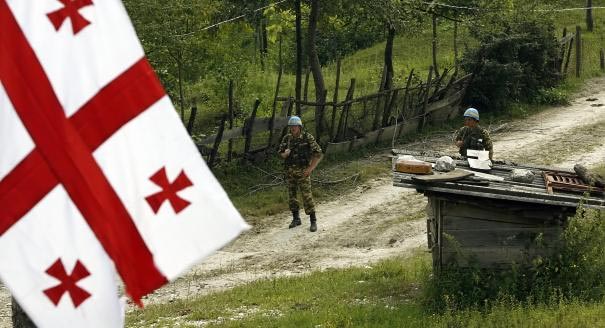Just before the 5th anniversary of the August 2008 war, Georgia and Russia are back in the headlines—with positive news: Georgian wine has reconquered the shelves of Russian supermarkets after a seven year boycott. Undoubtedly, this memorable event has been made possible by a new political leadership in Tbilisi. After winning the parliamentary elections in October 2012, the new Premier Bidzina Ivanishvili declared improving relations with Russia a priority of his foreign policy. Further steps, for instance restoration of direct flights between Moscow and Tbilisi and smoothening of the visa regime, are expected with President Saakashvili’s likely departure from the political scene at the end of this year.
For Europe, the victory of Ivanishvili and his change of course in relations with Russia came as a surprise. Over the last years, European leaders have become accustomed to President Saakashvili and his pro-Western foreign policy course, which advocated integration into European Union and NATO structures at the expense of relations with Russia. Despite the lack of progress in conflict resolution with Abkhazia and South Ossetia, Georgia became the bearer of hope for the European Union’s efforts to transform its Eastern neighborhood into a zone of stability and democracy. Against this background, Ivanishvili is seen as the great unknown with suspiciously close contacts with Russia. The key question remains: Is it possible for former Soviet countries to have good relations with Europe and Russia at the same time?
To be perfectly honest, Europe has to admit that its own efforts to facilitate a solution of the conflict between Russia and Georgia over the breakaway territories had only limited success. After the “hot phase” of the conflict, Georgia quickly slid down on the European Union’s agenda of priorities. Maintaining good relations with Russia trumped any further pressuring for Georgia’s case. But three essential pillars of the European Union’s engagement policies remained: a) The Russian-Georgian peace agreement, brokered by former French President Nicolas Sarkozy; b) the guarantee not to recognize the independence of South Ossetia and Abkhazia (and convincing other countries not to do so either); and c) the European Union Monitoring Mission (EUMM), responsible for observing the implementation of the peace agreement. Furthermore, the European Union is involved in the “Geneva discussions,” an international mediation process with the participation of Russia, Georgia, Abkhazia, and South Ossetia.
The track record of this engagement is mixed: The peace agreement was vaguely formulated and is still only partially fulfilled; the non-recognition of South Ossetia and Abkhazia was rather an act of passive resistance, but failed to produce any positive impact on the process of conflict resolution; and the EUMM remains a toothless tiger, only allowed to monitor the Georgian side of the boundary line and unable to stop the so-called “borderization” process, i.e. the build-up of fences and barbed wires especially at the boundary line with South Ossetia. In addition, the “Geneva discussions” have been stalled for months. Meanwhile in Europe the willingness to invest further resources for a resolution of the conflict is fading. It was only a small success when Switzerland, representing the diplomatic and consular interests of both countries, convinced Georgia to accept Russia’s accession to the World Trade Organization. This certainly helped to maintain some minimal bonds between Russia and Georgia, but had no effect on the long-term prospects of Georgian-Russian relations.
Officially the European Union supports Premier Ivanishvili’s new policy course toward Russia. The EU Commissioner for Enlargement and European Neighbourhood Policy, Štefan Füle, has said repeatedly that an improvement of Georgian-Russian relations was also in the EU’s interest. Internally, however, the member states are worried that a second “Ukraine scenario” could occur, in other words: that Georgia could eventually abandon its Euro-Atlantic integration path in exchange for Russian concessions over South Ossetia and Abkhazia. Therefore, the Georgian-Russian rapprochement is met with scepticism, and the EU seeks again and again reassurances from the Georgian government that improved relations with Russia will not affect the ongoing negotiations about the EU-Georgia Association Agreement, which is supposed to be signed at the Eastern Partnership Vilnius Summit in November.
In light of the fading interest and ambiguous feelings, Georgia should not expect any meaningful support from Europe for the long-term normalization of its relations with Russia. Nor is a European initiative for the resolution of the conflict with Abkhazia and South Ossetia likely in the near future. Georgia has to go down this path on its own—and get it right.
Cécile Druey is a project coordinator at the Swiss Peace Foundation Swisspeace.
Liana Fix, a visiting researcher at the Carnegie Moscow Center in the summer of 2013, is a Mercator Fellow on International Affairs working on European-Russian relations.
